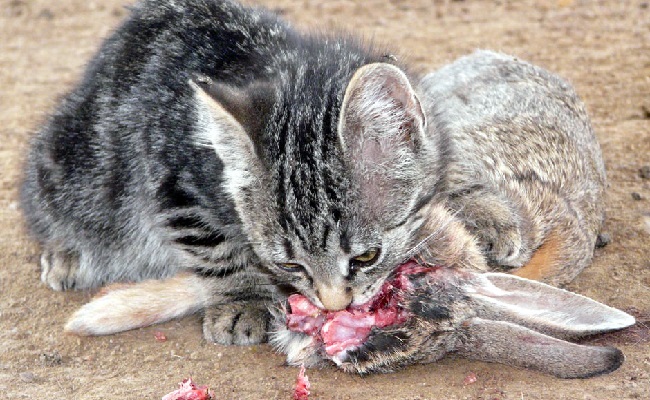As cat owners, we’re often intrigued by our feline friends’ dietary habits. One question that pops up frequently is, “Do cats eat rabbits?” This article will unravel this query, diving into the world of feline diet and hunting behavior.

Cats: The Natural Hunters
Cats are obligate carnivores, meaning their diet must consist mostly of meat to meet their nutritional requirements. They have a natural instinct to hunt, which can extend to smaller mammals, birds, and insects. This instinct remains whether your cat is a seasoned outdoor explorer or a strictly indoor pet.
Read Also:
Do Cats Eat Rabbits?
The short answer is yes; cats can and do eat rabbits, especially if they have access to the outdoors and their predatory instincts kick in. Cats are skilled hunters that can catch a variety of small animals, including rabbits.
Predatory Behavior vs. Dietary Needs
However, it’s essential to understand that a cat’s hunting behavior does not always correlate directly with its dietary needs.
A well-fed cat might still hunt due to its natural instinct, not hunger. Also, hunting and eating prey are two distinct behaviors – some cats may hunt and kill rabbits but not consume them.
The Risks of Cats Hunting Rabbits
While cats can eat rabbits, it’s crucial to consider the potential risks associated with this behavior.
Health Risks
Rabbits, like all wild animals, can carry diseases and parasites that can be transmitted to your cat. This includes the deadly parasite, Tularemia, which can be transmitted through ingestion or even through skin contact with an infected rabbit.
Environmental Impact
Cats hunting wildlife can have significant environmental implications. In some regions, domestic cats have contributed to the decline of local wildlife populations, which can disrupt the balance of local ecosystems.
What to Do If Your Cat Hunts Rabbits?
If your cat frequently hunts rabbits, it’s advisable to consult with a veterinarian or a cat behaviorist. They can provide advice on how to manage your cat’s hunting instincts and help protect local wildlife.
In some cases, a high-protein diet can help satisfy your cat’s instinctual need for meat, reducing their desire to hunt.
Impact on Rabbit Populations
When discussing whether cats eat rabbits, it’s crucial to consider the impact of this behavior on local rabbit populations.
In regions where rabbits play an essential role in maintaining the ecosystem balance, predation by cats can be detrimental.
Not only does this hunting habit risk depleting rabbit populations, but it also disrupts other species that depend on these rabbits for food or whose habitats are maintained by rabbit behaviors.
Cats’ Nutritional Requirements
Cats are obligate carnivores, which means they require certain nutrients found primarily in meat. This includes taurine, an essential amino acid; arachidonic acid, a fatty acid; and vitamins A, D, and B12.
However, it’s important to remember that a balanced diet for cats cannot be achieved solely through hunting. Domestic cats need a complete and balanced diet, typically provided through high-quality commercial cat food, to meet all their nutritional needs.
Potential Behavioral Changes in Cats
A cat’s hunting behavior can sometimes cause noticeable behavioral changes. For example, if a cat is regularly hunting and eating rabbits, they may exhibit signs of aggression or become territorial.
If you notice any significant changes in your cat’s behavior, it’s advisable to consult with a professional.
Safeguarding Your Cat and Local Wildlife
There are several steps you can take to protect both your cat and local wildlife:
Bell Collars
One of the most common methods is attaching a bell to your cat’s collar. The sound of the bell can warn potential prey of the cat’s approach, giving them a chance to escape.
Confinement during Peak Hunting Times
Most hunting activities happen around dawn and dusk. Keeping your cat indoors during these peak times can reduce their hunting success rate.
Provide Sufficient Playtime
Playing with your cat using toys that stimulate their hunting instincts can also help curb their desire to hunt.
Read Also:
Conclusion
Cats are capable hunters and, yes, they can eat rabbits. However, their hunting behavior is often instinctual rather than a dietary requirement.
It’s important to understand the potential risks associated with cats hunting rabbits and to take necessary measures to ensure both your cat’s health and the health of local ecosystems.
























